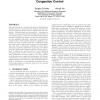Free Online Productivity Tools
i2Speak
i2Symbol
i2OCR
iTex2Img
iWeb2Print
iWeb2Shot
i2Type
iPdf2Split
iPdf2Merge
i2Bopomofo
i2Arabic
i2Style
i2Image
i2PDF
iLatex2Rtf
Sci2ools
113
click to vote
NOSSDAV
2001
Springer
2001
Springer
The utility of feedback in layered multicast congestion control
Layered multicast is a common approach for dissemination of audio and video in heterogeneous network environments. Layered multicast schemes can be classified into two categories – feedback-based and feedback-free – depending on whether or not the scheme delivers feedback to the sender of the multicast session. Advocates of feedback-based schemes claim that feedback is necessary to match the heterogeneous receiver capabilities efficiently. Supporters of feedback-free schemes believe that feedback introduces significant complexity and that a moderate amount of additional layers can balance any benefit the feedback provides. Surprisingly, there has been no systematic evaluation of these claims. This paper provides a quantitative comparison of feedbackbased and feedback-free layered multicast schemes with respect to aligning the provided service to the capabilities of heterogeneous receivers. We discover realistic scenarios when feedback-free schemes require a very large number of...
Computer Networks | Feedback-based Scheme | Feedback-free Schemes | Multicast Schemes | NOSSDAV 2001 |
Related Content
| Added | 30 Jul 2010 |
| Updated | 30 Jul 2010 |
| Type | Conference |
| Year | 2001 |
| Where | NOSSDAV |
| Authors | Sergey Gorinsky, Harrick M. Vin |
Comments (0)

